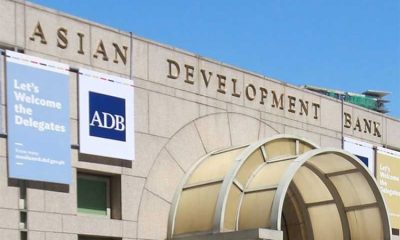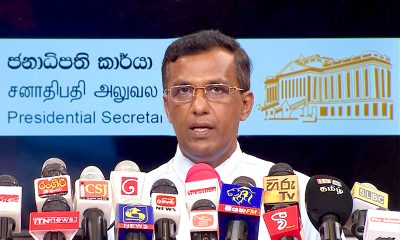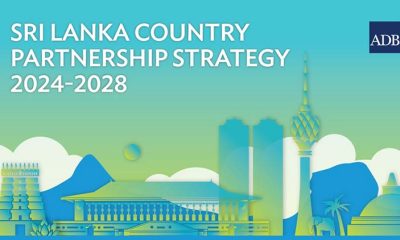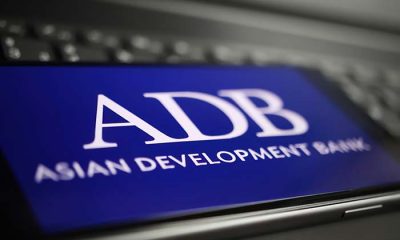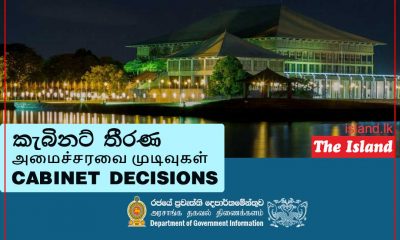Business
Business as usual no longer tenable for Sri Lanka given extremely difficult fiscal conditions: Treasury Secretary
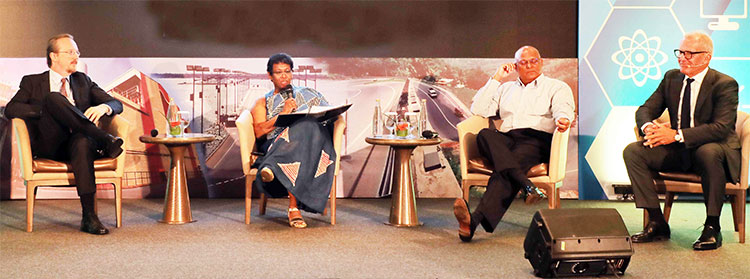
By Sanath Nanayakkare
Given the extremely difficult fiscal conditions Sri Lanka is experiencing, there is no room for complacency or reversal of the key economic reforms underway because business as usual is no longer tenable for Sri Lanka, Treasury Secretary Mahinda Siriwardana warned in Colombo on Tuesday
He said so while speaking at the Serendipity Knowledge Programme (SKOP) which is an Asian Development Bank (ADB) platform dedicated to identifying knowledge solutions for Sri Lanka’s development challenges. The event was held at Shangri La Colombo where the welcome address was delivered by Kenichi Yokoyama, Director General, South Asia Development, ADB. The keynote presentation on SOE Reform: Lessons from other countries was delivered by Dag Detter, former President of Stattum and Director Ministry of Industry Sweden. Suresh Shah, Chairman, SOE Restructuring Unit was among the eminent panelists that delved deep into SOE reforms: Challenges and Opportunities for Sri Lanka.
Speaking further the Treasury Secretary said:
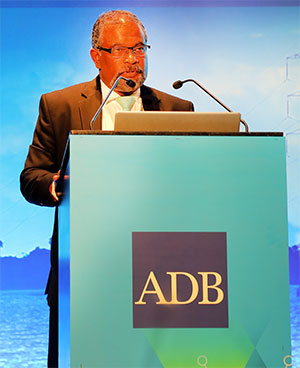
Treasury Secretary Mahinda Siriwardana
“Divestiture of SOEs is being discussed at a time Sri Lanka is experiencing its worst economic crisis since its independence which led to far-reaching economic and social ramifications. The government has taken a series of measures to stabilize the economy and gradually restore economic growth in a sustainable manner going forward while implementing critical economic reforms. In the present context, there is noroom for complacency and there is no margin for error by reverting to unsustainable policies and practices of the past.”
“As in many developing and emerging economies Sri Lanka’s SOEs have contributed to the ongoing crisis although they have shown a mixed record of their contribution to the economy. While some sectors like state-owned banks make an important contribution to the economy, several SOEs in sectors such as energy and transport have created persistent losses. SOEs are vulnerable to mismanagement and corruption because of potential conflicts within the ownership and the policy-making functions of the government and undue political influence on their policies, appointments and business practices. Also, their internal controls, monitoring and the government’s frameworks are inadequate to deal with these issues. Many of these institutions have pursued a monopolistic position in the market hindering private investment. Price-fixing, inefficient management and poor entrepreneurship have weakened public finances turning these institutions into national burdens dependent on the tax payers, therefore the success or the failure of these SOEs has had a significant impact on the economy as a whole. Highly loss-making SOEs such as CPC, CEB and Sri Lankan Airlines pose significant fiscal issues as their losses have to be addressed through Treasure transfers or public debt. Loss-making SOEs also create vulnerabilities in the banking system because the accumulated debt is often funded by the state banks. This has created a complex interaction between the balance sheets of these institutions, the banks and the government. All these challenges require comprehensive reforms which have been delayed for a prolonged period and have resulted in significant macroeconomic vulnerabilities. As indicated in the interim budget speech in 2022, these difficult but necessary measures pertaining to SOEs will no doubt pose challenges in its implementation, but failing to do so will have catastrophic risks in financial stability and even higher taxation burdens in the future. This is why the restructuring of SOEs is critical in terms of government revenue and expenditure. In making the necessary reforms, learning from the success stories from the neighboring economies and the rest of the world would be of great importance to us. Globally, countries have increasingly moved away from state-led development strategy, encouraging private sector to engage in business with the government making the proper policies and regulatory frameworks without compromising the long-term interests and the wellbeing of the public. To achieve these objectives the government is making progress in several key reform areas. One of them is the cost-reflective pricing of utilities and petroleum products, Sri Lanka being a net energy importing country. However, this creates hardships to the poor and the vulnerable. So the government has chosen the strategy of providing direct cash transfers and other measures of relief to those objectively identified segments of the society instead of underpricing utilities across the board. This approach will also minimize inefficient energy use by more affluent consumers.”
“Reform number two is balance sheet restructuring. The foreign-currency denominated loans guaranteed by the sovereign on behalf of CPC and most of the same of CEB, Sri Lankan Airlines and RDA will be restructured eliminating the risks and mismatches to the fiscal sector.”
“Reform number three is introducing competiveness in key economic sectors by driving productivity of these enterprises. An example for this is Sinopec, another player that entered the petroleum retail space last week. At the same time, the government has undertaken an initiative to unbundle operations at the CEB where ADB is playing a key role. This will lead to greater operational and financial indicators of electricity generation and distribution activities enabling competition within the entity, improved transparency through bulk supply transaction accounts to get better outcomes for consumers as a whole. The automation of obsolete manual reading of meters would benefit consumers through predictable and timely readings while improving efficiency of the workforce.”
“Divestment of non-strategic assets is the key reform number 4 to drive economic activity in this area. The approval of the Cabinet has already been given for divestment of several entities and transaction advisories have been appointed to support the programme in a transparent, professional manner.”
“Reform number five is governance and legislation to avoid the recurrence of financial vulnerabilities in SOEs. In this exercise, an overarching legal framework will be brought in to ensure proper appointments of SOE board members and other senior management, regular publishing of financial reports, due diligence over procurements and the upholding of corporate governance principles.”
Business
AHK Sri Lanka champions first-ever Sri Lankan delegation at Drupa 2024

The Delegation of German Industry and Commerce in Sri Lanka (AHK Sri Lanka) proudly facilitated the first-ever Sri Lankan delegation’s participation at Drupa 2024, the world’s largest trade fair for the printing industry and technology. Held after an eight-year hiatus, Drupa 2024 was a landmark event, marking significant advancements and opportunities in the global printing industry.
AHK Sri Lanka played a pivotal role in organising and supporting the delegation, which comprised 17 members from the Sri Lanka Association for Printers (SLAP), representing eight companies from the commercial, newspaper, stationery printing, and packaging industries. This pioneering effort by AHK Sri Lanka not only showcased the diverse capabilities of Sri Lanka’s printing sector but also facilitated vital bilateral discussions with key stakeholders from the German printing industry.
Business
Unveiling Ayugiri: Browns Hotels & Resorts sets the stage for a new era in luxury Ayurveda Wellness

In a captivating reimagining of luxury wellness tourism, Browns Hotels & Resorts proudly unveiled the exquisite Ayugiri Ayurveda Wellness Resort Sigiriya. This momentous occasion, celebrated amidst a vibrant and serene grand opening on the 6th of June, heralds a new chapter in the Ayurveda wellness tourism landscape in Sri Lanka. Nestled amidst 54 acres of unspoiled natural splendour, Ayugiri features 22 exclusive suites and stands out as the only luxury Ayurveda wellness resort in the country offering plunge pools in every room, rendering it truly one-of-a-kind.
The grand opening of Ayugiri Ayurveda Wellness Resort was an enchanting event, where guests were captivated by the melodies of flutists and violinists resonating through Sigiriya’s lush landscapes. As traditional drummers and dancers infused the air with vibrant energy, Browns Hotels & Resorts’ CEO, Eksath Wijeratne, Kotaro Katsuki, Acting Ambassador for the Embassy of Japan and General Manager, Buwaneka Bandara, unveiled the resort’s new logo, marking a significant moment witnessed by distinguished guests from the French Embassy, Ayurveda and wellness enthusiasts along with officials from the Sigiriya area, LOLC Holdings and Browns Group.
“Our strategic expansion into wellness tourism with Ayugiri Ayurveda Wellness Resort Sigiriya symbolises a significant milestone for Browns Hotels & Resorts. Wellness tourism has consistently outperformed the overall tourism industry for over a decade, reflecting a growing global interest in travel that goes beyond leisure to offer rejuvenation and holistic well-being. By integrating the timeless wisdom of Ayurveda with modern luxury, we aim to set a new standard in luxury wellness tourism in Sri Lanka. Whether your goal is prevention, healing, or a deeper connection to inner harmony, Ayugiri offers a sanctuary for holistic well-being” stated Eksath Wijeratne.
Ayugiri encapsulates the essence of life, inspired by the lotus flower held by the graceful queens of the infamous Sigiriya frescoes. Just as the lotus emerges from the murky depths, untainted and serene,
Ayugiri invites guests on a journey of purity and rejuvenation, harmonised with a balance of mind, body and spirit, the essence of nature, echoes of culture and the wisdom of ancient Ayurvedic healing.
Business
HNB General Insurance recognized as Best General Bancassurance Provider in Sri Lanka 2024

HNB General Insurance, one of Sri Lanka’s leading general insurance providers, has been honored as the Best General Bancassurance Provider in Sri Lanka 2024 by the prestigious Global Banking and Finance Review – UK.
The esteemed accolade underscores HNB General Insurance’s unwavering commitment to excellence and its outstanding performance in the field of bancassurance. Through dedication and hard work, the HNB General Insurance team has continuously endeavored to deliver innovative insurance solutions, cultivate strong relationships with banking partners, and provide unparalleled service to customers nationwide. This recognition is a testament to the team’s dedication and relentless pursuit of excellence in the bancassurance business.
“We are honored to receive this prestigious award, which reflects our team’s tireless efforts and dedication to delivering value-added insurance solutions and exceptional service through our bancassurance partnerships,” said Sithumina Jayasundara, CEO of HNB General Insurance. “This recognition reaffirms our position as a trusted insurance provider in Sri Lanka and motivates us to continue striving for excellence in serving our customers and communities.”


